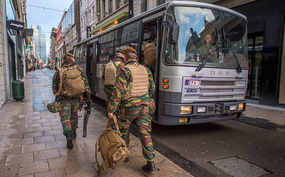 Kenison Garratt Editor-in-Chief and A&E Editor Explosions hit Brussels, the capital of Belgium and the headquarters of the European Union, on March 22. There were at least thirty-one killed, and more are injured. Brussels went on lockdown immediately following the first bombing. All airports, metro stations, and other public buildings and transportations were shut down or relocated. The French and Belgian border was also closed. The first two blasts were at an airport in Zaventem, the main airport of the European capital at about 8 A.M. The first target was the departure hall. The second explosion followed minutes later in another area of the airport. It has been confirmed that one of the explosions was carried out by a suicide bomber, and allegedly, there were shouts in Arabic heard before the bombs were detonated. A Kalashnikov AK-47 rifle and undetonated explosive belt were found at the airport. The final blast occurred an hour later at a subway station close to the European Union headquarters. It is possible there could have been two explosions at Maelback station, but it is still being investigated. Former Apex High student Rey Tshiama, who now lives in Belgium about an hour from Brussels, describes how he feels about it. “I'm disgusted by their attack, because ISIS sacrifices so many lives in the name of God. 31 people died, 220 were injured, and a lot of people are missing. ISIS proudly admitted that it was their fault, and [they] told the media that this was just the beginning.”
The Belgian federal prosecutor Frederic Van Leeuw called the three explosions terrorists attacks. They were likely committed in retaliation for the imprisonment of Salah Abdeslam, a suspect of the Paris attacks in November who fled to Brussels, on March 19. Since then, Brussels has been heavily involved in planning on how to counter terrorism. “Everyone in Belgium and Europe stands united. Civilians keep living their normal lives, and the police is doing everything they can to make people feel safe. They patrol the streets in teams of 3-4 with heavy guns and dogs; in school today, we had to show our student ID to a security guard to be allowed in the building,” says Tshiama. “The government is being really protective.” The nation has a lot of Muslim communities that are believed to possibly be aiding in hiding jihadists. Officials have been focusing on a Brussels neighborhood in their search for a radical Islamic recruitment network, and they have taken to increasing security around nuclear power plants, one of which has already been evacuated. Prime Minister David Cameron of Britain has called an emergency meeting of ministers, and President Barack Obama has offered aid to Belgium, adding that the United States will do “whatever is necessary” to find the attackers. Chicago, London, New York, and Paris are some of the major cities increasing their security. Tshiama feels safe in his own small town; instead his concern is on the larger cities. “I believe they have plans to only attack important places to make a statement and install fear in people's lives, and the only way for common citizens to beat them is to not show fear and [to] keep living life.” Comments are closed.
|
Archives
March 2017
Categories
All
|

